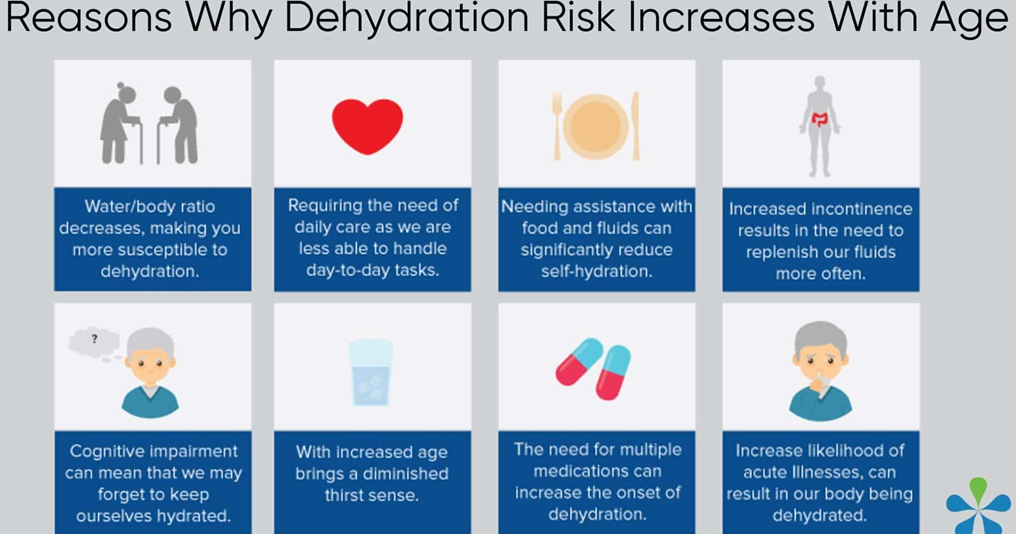Which patient is at the highest risk for dehydration?
Elderly patient with fever and nausea and vomiting
Teenager who has intentionally limited fluid intake to avoid weight gain
Young patient with diarrhea
Infant who has a fever
The Correct Answer is A
Choice A: Elderly patients are at a higher risk for dehydration due to physiological changes that come with aging, such as decreased kidney function and physical changes to the body's water balance systems. Additionally, fever increases metabolic rate and fluid loss, and nausea and vomiting prevent adequate fluid intake, further increasing the risk of dehydration.
Choice B: While intentionally limiting fluid intake can lead to dehydration, the body's thirst mechanism in a healthy teenager is typically strong enough to prevent severe dehydration.
Choice C: Diarrhea can certainly lead to dehydration, but a young, otherwise healthy patient typically has a stronger ability to recover from fluid loss than an elderly patient.
Choice D: Infants are at a higher risk for dehydration than older children and adults due to their smaller body weight and higher turnover of water and electrolytes, but in this case, the elderly patient's multiple risk factors put them at a higher risk overall.

Nursing Test Bank
Naxlex Comprehensive Predictor Exams
Related Questions
Correct Answer is C
Explanation
Choice A reason: This is incorrect because respiratory alkalosis is a condition where the blood pH is higher than the normal range of 7.35 to 7.45, due to hyperventilation, which lowers the carbon dioxide in the blood. Severe diarrhea does not cause hyperventilation, but rather dehydration and electrolyte imbalance.
Choice B reason: This is incorrect because metabolic alkalosis is a condition where the blood pH is higher than the normal range of 7.35 to 7.45, due to a loss of acids or an excess of bases in the body. Severe diarrhea does not cause a loss of acids or an excess of bases, but rather a loss of fluids and bicarbonate, which is a base that buffers the acids in the blood.
Choice C reason: This is correct because metabolic acidosis is a condition where the blood pH is lower than the normal range of 7.35 to 7.45, due to an excess of acids or a loss of bases in the body. Severe diarrhea causes a loss of fluids and bicarbonate, which is a base that buffers the acids in the blood. This leads to an accumulation of acids and a decrease in pH.
Choice D reason: This is incorrect because respiratory acidosis is a condition where the blood pH is lower than the normal range of 7.35 to 7.45, due to impaired gas exchange or hypoventilation, which causes carbon dioxide to accumulate in the blood. Severe diarrhea does not affect the respiratory system directly, but rather the metabolic system.
Correct Answer is A
Explanation
Choice A reason: Renal failure can cause hyperkalemia because the kidneys are unable to excrete excess potassium from the body. This can lead to high levels of potassium in the blood, which can affect the heart and muscles.
Choice B reason: Diarrhea can cause hypokalemia, not hyperkalemia, because it can lead to loss of potassium from the gastrointestinal tract. This can result in low levels of potassium in the blood, which can also affect the heart and muscles.
Choice C reason: Blood transfusion can cause hyperkalemia if the blood is old or hemolyzed, meaning that the red blood cells have broken down and released potassium into the plasma. This can increase the potassium levels in the recipient's blood.
Choice D reason: Diaphoresis, or sweating, can cause hypokalemia, not hyperkalemia, because it can lead to loss of potassium from the skin. This can also lower the potassium levels in the blood.
Whether you are a student looking to ace your exams or a practicing nurse seeking to enhance your expertise , our nursing education contents will empower you with the confidence and competence to make a difference in the lives of patients and become a respected leader in the healthcare field.
Visit Naxlex, invest in your future and unlock endless possibilities with our unparalleled nursing education contents today
Report Wrong Answer on the Current Question
Do you disagree with the answer? If yes, what is your expected answer? Explain.
Kindly be descriptive with the issue you are facing.
